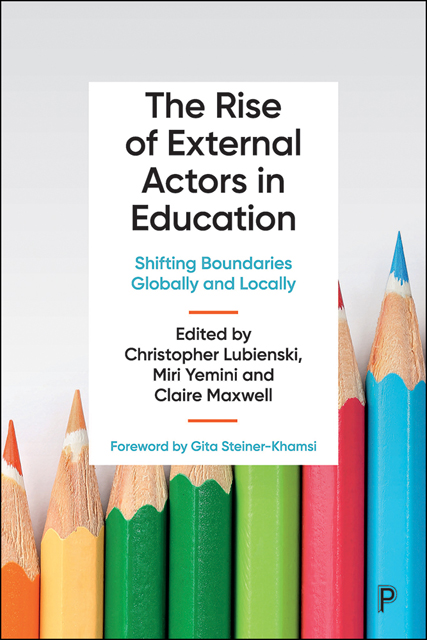Book contents
- Frontmatter
- Contents
- List of figures and tables
- Notes on contributors
- Foreword
- Introduction
- 1 Collective parental involvement: an in-between actor
- 2 When teachers become the external actor: private tutoring and endogenous privatisation in Cambodia
- 3 Cross-sectoral alliances in charter schools: the role of boards of directors from for-profit and non-profit sectors
- 4 A communitarian framework for understanding the relations between schools and NGOs
- 5 PISA for sale? Creating profitable policy spaces through the OECD’s PISA for Schools
- 6 Historical reconfigurations of internal/external actors in Danish educational testing practices
- 7 A short history of external agency involvement within education in contemporary Poland
- 8 New philanthropy in the heterarchical governance of education in Brazil
- 9 Venture philanthropy and the rise of external actors in Australian education
- 10 Power struggle in education policy change: the role of knowledge actors in structural reforms in Chile
- Conclusion: Complexity and intentionality of external actors in education
- Index
2 - When teachers become the external actor: private tutoring and endogenous privatisation in Cambodia
Published online by Cambridge University Press: 13 October 2022
- Frontmatter
- Contents
- List of figures and tables
- Notes on contributors
- Foreword
- Introduction
- 1 Collective parental involvement: an in-between actor
- 2 When teachers become the external actor: private tutoring and endogenous privatisation in Cambodia
- 3 Cross-sectoral alliances in charter schools: the role of boards of directors from for-profit and non-profit sectors
- 4 A communitarian framework for understanding the relations between schools and NGOs
- 5 PISA for sale? Creating profitable policy spaces through the OECD’s PISA for Schools
- 6 Historical reconfigurations of internal/external actors in Danish educational testing practices
- 7 A short history of external agency involvement within education in contemporary Poland
- 8 New philanthropy in the heterarchical governance of education in Brazil
- 9 Venture philanthropy and the rise of external actors in Australian education
- 10 Power struggle in education policy change: the role of knowledge actors in structural reforms in Chile
- Conclusion: Complexity and intentionality of external actors in education
- Index
Summary
Introduction
In Cambodia, the majority of students participate in private tutoring provided by public school teachers to their own students – a phenomenon called rien kuo. In a survey of 1,274 students in grades 9 and 12, Bray and colleagues found that 75 per cent of Grade 9 students and 89.8 per cent of Grade 12 students were attending rien kuo (Bray et al, 2016; Bray et al, 2018). For these students, private tutoring is just as essential as formal schooling. Without tutoring, students would not be able to pass crucial exams and advance in the education system. Given that rien kuo functions as a natural extension of the mainstream public schooling system, Brehm and Silova (2014) argue that Cambodian education can be accurately described as a hybrid publicprivate education system.
The rien kuo phenomenon is an interesting but under-examined example of the ongoing neoliberalisation and privatisation of education worldwide, especially the growing and complex influence of ‘external actors’ on educational policy, provision, governance, and outcomes (Ball & Junemann, 2012; Verger et al, 2016; Lubienski & Perry, 2019). The case of private tutoring in Cambodia addresses a situation where actors internal to the school system (teachers) are incentivised to act in ways that are considered typical of ‘external’ actors; that is, engaging in profit-seeking behaviour by charging fees to their students. While the literature on the growing influence of external actors in education has often focused on for-profit businesses or non-profit and third-sector organisations, this chapter extends the concept of ‘external actor’ by introducing this hybrid case where the teacher operates in both an internal and external capacity. It identifies the context and factors giving rise to this dual role by describing the integral nature of private tutoring to student progression in school and the ‘endogenous privatisation’ (Ball & Youdell, 2009) this has prompted. Our findings demonstrate how teachers acting in external capacities can have great impact on teacher and student motivation, curriculum and pedagogy, assessment, and broad expectations of public schooling through the introduction of market-oriented mindsets and mechanisms into education and, more specifically, the teacherstudent relationship.
- Type
- Chapter
- Information
- The Rise of External Actors in EducationShifting Boundaries Globally and Locally, pp. 31 - 49Publisher: Bristol University PressPrint publication year: 2022

